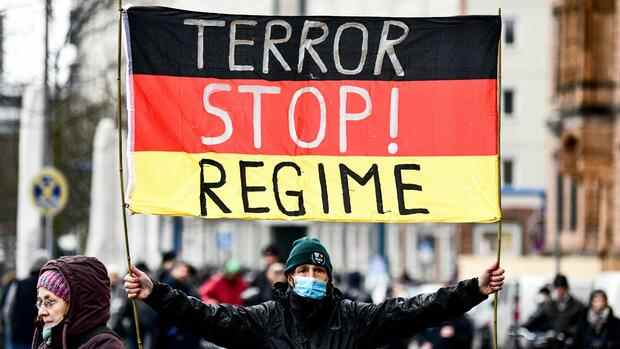Radicalization tendencies as a result of the corona pandemic – especially in social media.
(Photo: dpa)
Berlin The Association of Towns and Municipalities calls for better protection for officials and elected officials against intimidation, hate speech and violence. Increased penalties should not be taboo.
“A new criminal offense of so-called politician stalking should create the opportunity to take action against the marches in front of the apartments of officials and elected officials,” said managing director Gerd Landsberg of the Handelsblatt. “These incidents are purely for intimidation and have nothing to do with the right to demonstrate, which rightly enjoys a high priority in our constitution.”
This Tuesday, Federal Minister of the Interior Nancy Faeser (SPD) together with the President of the Federal Criminal Police Office (BKA), Holger Münch, will present the number of cases of politically motivated crime for 2021.
Preliminary figures from the BKA, which the Handelsblatt reported on a few months ago, indicate that politically motivated crime against politicians may have increased significantly. The BKA also attributes the increase in criminal offenses to radicalization tendencies in social media as a result of the corona pandemic. Above all, what is happening in the messenger service Telegram is viewed with concern.
Top jobs of the day
Find the best jobs now and
be notified by email.
Landsberg expressed concern about the increase in hate crimes against politicians. The background is also threats and protests in front of the homes of politicians, for example against the Saxon Prime Minister Michael Kretschmer (CDU) and his Health Minister Petra Köpping (SPD), the SPD Health Minister Karl Lauterbach as well as mayors and district administrators.
Study: Hardly a day goes by without agitation and violence
Landsberg also referred to a study published in April by the Brandenburg Ministry of the Interior. According to statistics, not a day had passed without incidents of hate speech and violence against officials and officials in Brandenburg. This development is “dramatic”, said the head of the association of cities. “The attacks are an attack on our democracy.”
>> Also read here: The fire accelerator: Why Telegram attracts corona extremists
Politicians also see a need for action. However, the Greens are critical of the tightening of penalties. “Attacks on public officials and elected officials are already subject to severe punishment,” parliamentary group leader Konstantin von Notz told the Handelsblatt. However, this often does not deter offenders. “Against this background, I am rather skeptical about the creation of a special paragraph in the penal code that only criminalizes politician stalking.”
Von Notz also pointed out that other groups of people are increasingly exposed to violence and threats. This applies, for example, to journalists, scientists or other people who are often volunteers. “They all need and deserve protection,” emphasized the Green politician.
Attempts at intimidation must therefore be countered “with full constitutional determination”. “This requires both a uniform procedure coordinated between the federal and state governments as well as nationwide advisory services and protection concepts that focus on the needs of those affected,” said von Notz.
Greens call for “law against digital violence”
The Greens politician referred to a large number of projects against hatred and hate speech agreed in the coalition agreement, which must now be tackled “promptly”. As examples, von Notz named a “law against digital violence” and improvements in the possibility of blocking the population register for threatened people.
The CSU domestic politician Andrea Lindholz also stated that politically motivated crime was increasing sharply overall. “Of course, demonstrations in front of official buildings must be permitted in principle, but demos in front of private houses reach a sensitive limit,” said the deputy leader of the Union parliamentary group. “In view of the sometimes frightening developments, tightening of criminal law should not be taboo.” However, these should be “proportionate and appropriate”.
Lindholz pointed out that criminal law had already been tightened to protect local politicians in the last electoral term. “In the end, even the best law does not help if it is not applied consistently because the authorities lack investigative powers, there is no resolute intervention on site or the case law does not exhaust the range of penalties.”
The chief of the Landsberg Association of Cities advised all those affected to report the attacks. He demanded that the police and public prosecutors pursue the crimes consistently. “We also need a broad alliance to protect our democracy,” said Landsberg. “An even broader social and public debate is needed about our democratic culture and about the necessity and acceptance of diverse democratic opinions.”
More: Truth instead of anger: how the EU is now taming the internet

